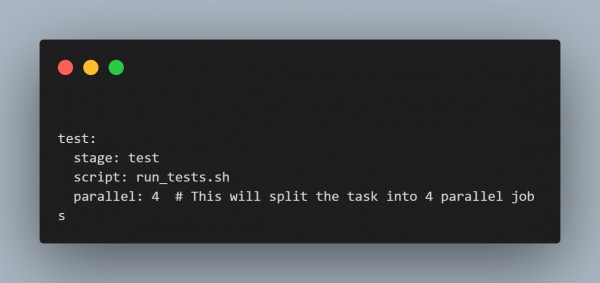Among other strategies to optimize build times in CI/CD pipelines is by using these techniques to minimize processing time and increase efficiency. This leads to identifying some of these important techniques along with their coding solutions. Optimize your CI/CD pipelines and boost efficiency with DevOps training—learn automation, containerization, and best practices for faster deployments!
1. Parallelize Tasks
Strategy: Carry out independent tasks in parallel rather than in sequence. For example, if they do not depend on each other, one can compile code, run unit tests and lint code in parallel.
Solution: Most CI/CD platforms, by default, have a feature to define stages that can run concurrently. For example, in GitLab CI you have the possibility to set jobs with the same stage to run in parallel:

2. Dependencies Optimization
Strategy: Cache dependencies so they aren't downloaded and installed on every build.
Solution: Your CI/CD platform probably has its own caching mechanism. For example, in CircleCI, you can cache dependencies like this:

3. Incremental Builds
Strategy: Build only those components that have been modified since the last build. This would save redundant work, thus making builds faster.
Solution: Tools like Bazel or Gradle natively support incremental builds and can be a part of your CI/CD pipeline.
4. Containerize Build Environments
Strategy: Use containerized environments for reliability of build environments and less time-consuming setup.
Solution: Pre-configuring Docker images with required tools and dependencies prior to their inclusion in a Docker container is one of the key strategies. For example, you can create your build environment Docker file and include this in your CI/CD pipeline as well:

5. Take advantage of pre-built binaries or artifacts
Strategy: Reuse pre-built binaries built from previous builds rather than compiling again.
Solution: Store and fetch pre-built artifacts using Artifactory or Nexus. It is really helpful in very big projects as full rebuilds are so long.
If you're looking for a better career, I personally suggest you take the DevOps Post Graduate Program!
 REGISTER FOR FREE WEBINAR
X
REGISTER FOR FREE WEBINAR
X
 Thank you for registering
Join Edureka Meetup community for 100+ Free Webinars each month
JOIN MEETUP GROUP
Thank you for registering
Join Edureka Meetup community for 100+ Free Webinars each month
JOIN MEETUP GROUP